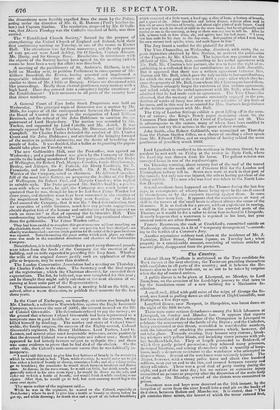In the Court of Exchequer, on Saturday, an action was
brought by Mr. Chattock, a solicitor in Warwickshire, against the Eagle Insurance Company, to recover the sum of 5000/., the amount insured on the life of Colonel Greswolde. The defendants refused to pay the money ; on the ground that whereas Colonel Greswolde had been represented as a temperate man in good health, he was very much the reverse, liming killed himself by drinking. The mother and sister of Colonel Gres- wolde, the family surgeon, the surgeon of the Elighty-secoed, Colonel Greswold's regiment, Mr. Henry Minium:es Lord Forbes, Lord G. Lennox, and several other most respectable witnesses, swore positively that the deceased Colonel was a temperate and robust man ; though it appeared be had latterly become sulject to epileptic fits ; and there was some evidence to prove that he had died of the cholera. On the other side, the Colonel's man-servant swore that be was habitually he. temperate.
I used (said this man) to give him four bottoms of brandy in the moraingr ; which he would drink in bed. Then, while dressing, he wutilil outer me to get him either a bottle of brandy or sherry, sometiams bath ; and after taking some, Ko to breakfast; the remainder he would drink between breakfast and dinner time. At dinrer, in the mess-room, he would cat little, but drink much, and generally retired to his own TCOM tipsy ; Ire would lie down on the sofa, and order me to fetch a bottle of brandy, and would drink it while smoking some cigars. After that, Ile would go to bed, but next morning would begin the same over again."
The mess-waiter of the regiment said— While he was in the regiment, he waited on the Colonel, especially at Dorchester ; where be ustd to give him a bottle of brandy or sherry before he gut up, and while dressing; he drank that and a quart of ale before breakfast; • which consisted of a little toast, a lurid egg, a slice of ham, a bottom of brandy, and a quart of ale. After breakfast and before dinner, witness often took to him six or seven bottoms of brandy, and about eight pints of malt liquor. Could not say how much Ile drank at table in the mess room ; but he sat generally until twelve or one in the morning, as long as there was any one to tulk to. After Ile left, witness took to him wine, ale, and spirits into his bed-room. " I never saw him unfit for Lis duty in the day-time. Independent of what I took him, his own servant took spirits, wine, and malt liquor to him."
The Jury found a verdict for the plaintiff for WOO/.
The Vice-Chancellor, on Wednesday, dissolved, with costs, the ex piffle injunction obtained by Mrs. Norton, to prevent the publication of the Coquette, by Mr. Churton. The injunction was granted on the affidavit of Mrs. Norton, that, according to her verbal egreement with Mr. Bull, Mr. Churton's late pattner, she was to Inure tire right of re- publishing inn a collected fm her contributions to La Belle AssembMe. But it appeared that there was a written agreement Letween Mrs. Norton and Mr. Bull, which gave the lady no title to her contributions; for which she was paid at the rate of 300/. a year ; after which they be- came the property of Mr. Bull, from whom Mr. Chmton purchased them. Mrs. Norton strangely forgot the existence of this written agreement, and relied solely on the verbal agreement with Mr. Bull ; who himself admitted that be lard made such au agreement. The Vice- Chancellor observed, that the memory of persons consteetly engaed in the pro. duction of works of fancy was often not very retentive of dry facts of business, and in this way he accounted for Mrs. Norton's forgetfulness of the written agreement with Mr. Bull.
The City of London Sittings exhibit a great frilling off in the num- ber of causes; tile King's Bench paper containing about 00, the Common Pleas about 80, and the Court of Exehequer not 40. This is advantageous to the suitors, many of whom have been enabled to commence and try their actions in the space of three months.
John Smith, alias Robert Goldsmith, was committed on Thursday from the Hatton Garden Office, on a charge of stealing a silver spoon front Mr. Edward Ellice, and on suspicion of having robbed the same gentleman of jewellery worth 10001.


























 Previous page
Previous page